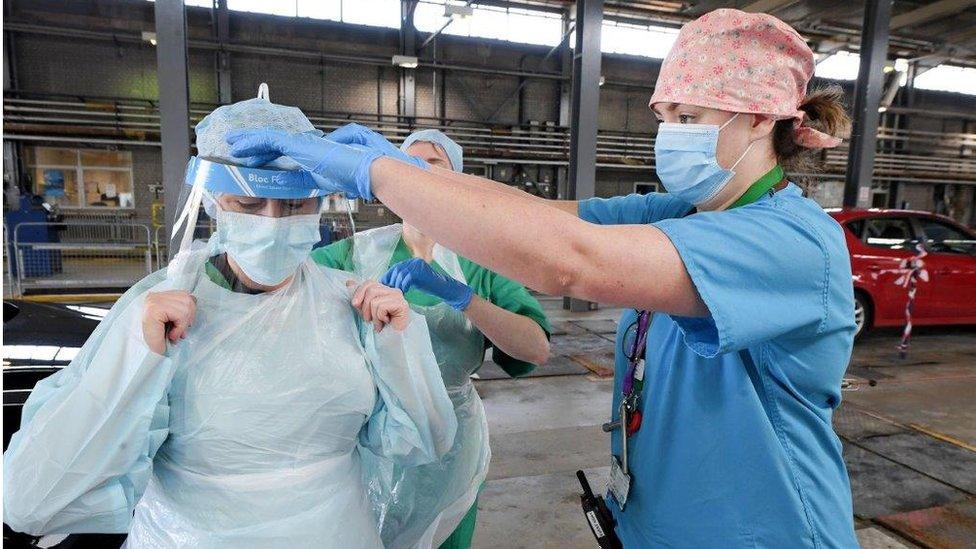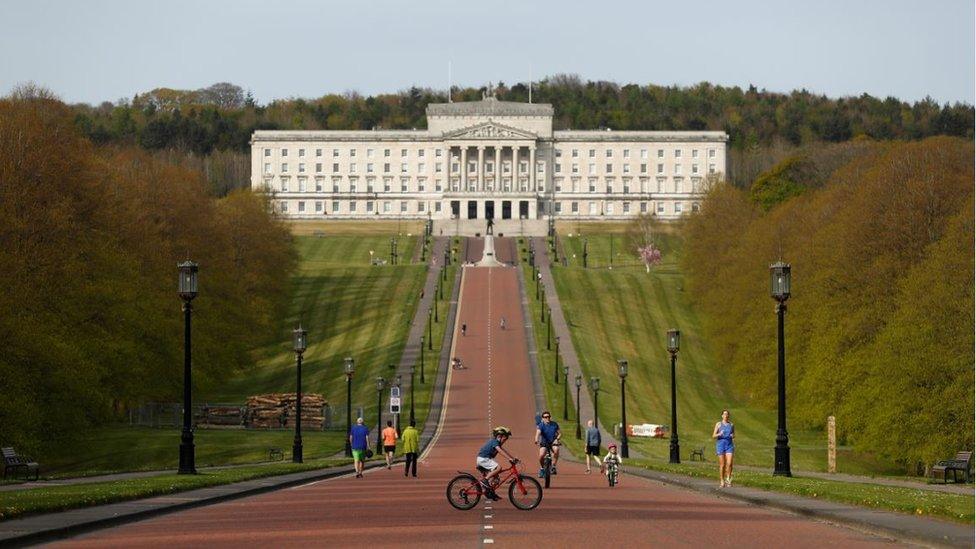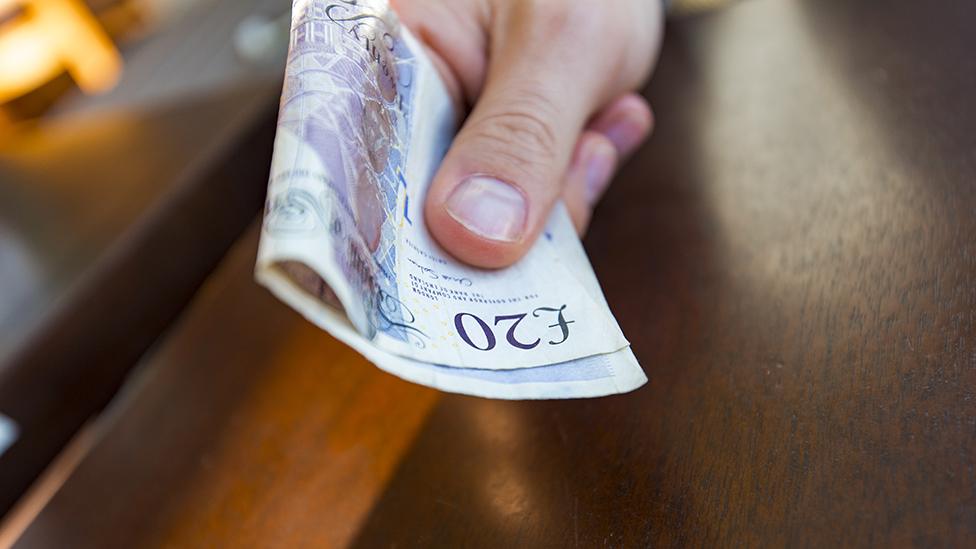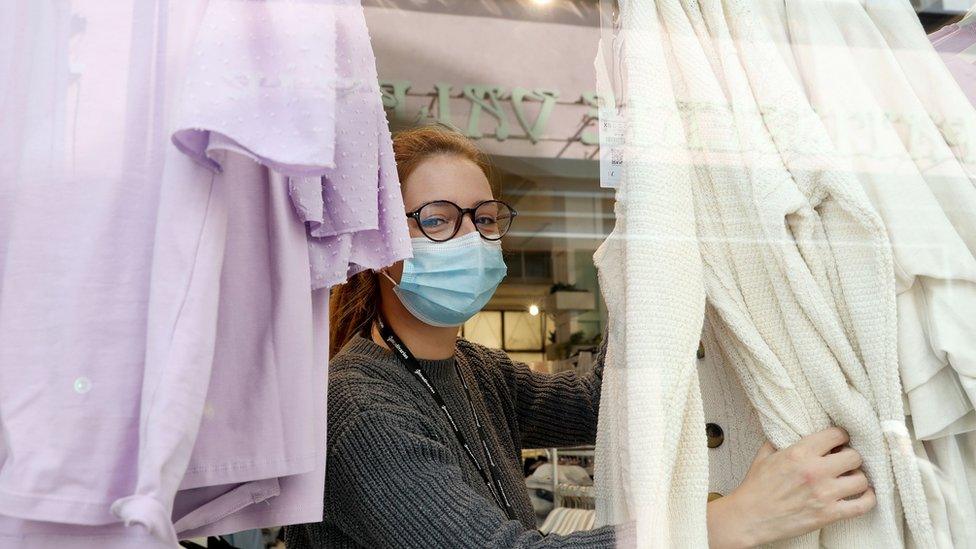Coronavirus: Stormont response 'has cost at least £2bn'
- Published
- comments

The Department of Health has incurred costs of £568m during the coronavirus pandemic
The Stormont Executive's response to NI's coronavirus pandemic has cost at least £2bn so far, estimates suggest.
A report by the NI Audit Office details spending within each Stormont department to handle the crisis.
It said the total cost to the public purse would ultimately be "much higher" as disruption continues in the coming months.
The bulk of cost was incurred by the health, finance and economy departments, it added.
The report does not provide an assessment of the value for money, or effectiveness, of individual measures taken by each of Stormont's nine executive departments.
But it does set out the bulk of the executive's Covid-19 emergency funding and a breakdown of it.

Out of the nine Stormont departments, the Department of Health has incurred the highest costs
The £2bn figure cited by the Audit Office also excludes the Northern Ireland cost of the UK government's furlough scheme.
It said that by August 2020, £1.74bn had been costed for 84 initiatives by Stormont departments since the start of the pandemic in March.
A further £465m was the estimated cost of other national schemes that apply to Northern Ireland, including support for the self-employed and increases in welfare payments.
The Audit Office said figures provided were the "most up‐to‐date cost projections" but, due to continually changing circumstances, they will be subject to change.

Tourism NI was given £10m to help staff working on a Game of Thrones tour
Out of the nine Stormont departments, the Department of Health has incurred the highest costs, with £568m for nine Covid-19 related initiatives.
The report said the department's spending on personal protective equipment (PPE) across the health and social care sector was "likely in excess of £200m", while other costs identified include £86m for supporting workforce deployments and £75m for surge planning.

What each department has spent on Covid-19
Department for the Economy - £407.9m
Costs include the £10,000 one-off grant for small businesses and £25,000 grant for retail, hospitality, tourism and leisure businesses, as well as support for higher and further education.
The department said it had also provided £10m to Tourism NI to support construction staff who had been working on a new Game of Thrones studio tour, which had to stop when the lockdown was imposed.
Department of Finance - £252.4m
The majority of the costs related to business rates relief and rate rebate relief.
Department for Infrastructure - £162m
Costs include £70m paid to Translink to cover losses following a "steep decline" in demand; £33m to NI Water to cover loss of income from non-domestic businesses closed due to the lockdown.
Department for Communities - £137.1m
Costs include £20m issued to NI's 11 councils to cover loss of income from March to June 2020; £10m to provide food parcels for vulnerable people in NI who had no other means of accessing food during lockdown.
Department of Education - £116m
Costs include £38m to provide payments to parents of children who normally received free school meals, with a further £12m to continue it over the summer months; £12m for childcare support and £1.6m estimated to provide for exams board CCEA to develop alternative arrangements for GCSEs, AS and A-levels after exams were cancelled.
Department of Justice - £54.8m
Costs include £13m to the PSNI to ease "pressures in maintaining critical services"; £12m to the NI Courts Service and £11m for PPE across departmental agencies to ensure staff safety.
Department of Agriculture, Environment and Rural Affairs - £40.3m
Costs include just under £29m as a package of support measures to help dairy, beef and horticulture sectors after experiencing a fall in prices and £4.1m on waste management to help councils cover collection and disposal costs.
The Executive Office - £4.3m
Costs attributed to advertising and coronavirus public information campaigns undertaken by the executive, as well as the costs of facilitating daily press conferences at Stormont.

The Audit Office said it had only recorded spending where an initiative by a department would have cost at least £1m.
Comptroller and auditor general Kieran Donnelly said the scale of the executive's response had been "unprecedented".
"There will undoubtedly be important lessons to learn, and this report provides my office with the basis for a programme of work evaluating how public money has been spent during this period," he said.
"As an initial step we intend to examine arrangements surrounding the supply of PPE in Northern Ireland; the support provided to lessen the impact on vulnerable groups and the wider impact of Covid-19 on public sector income."
The report also said that by 24 July, Westminster had committed to provide £2.2bn to NI to fund Covid-19 activities, through additional spending known as Barnett consequentials.
The "precise allocation" of all that funding has not yet been determined by the executive, it added.
- Published22 June 2021

- Published30 August 2020

- Published8 January 2021
